Good Omens Season 2 Easter Egg Guide: Doctor Who, Terry Pratchett and the Discworld
Did you spot these references to Agnes Nutter, Terry Pratchett's Discworld novels, Doctor Who and much more in Good Omens season two?
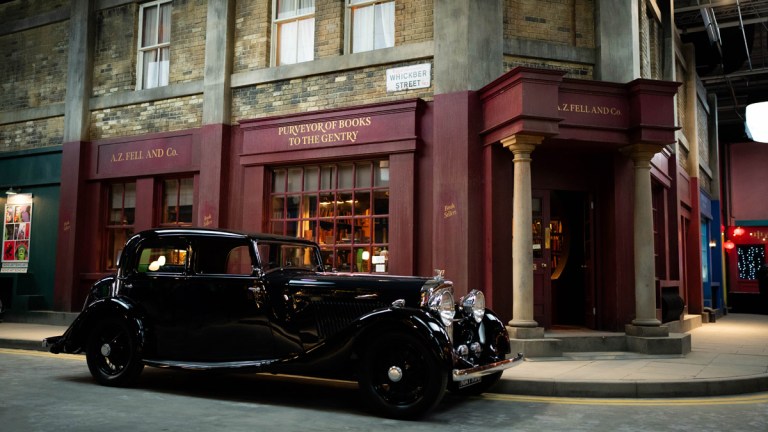
Warning: contains Some spoilers for Good Omens season two
There are over 200 Easter eggs scattered throughout Good Omens season two, buried in everything from oil paintings to posters to bookshelves. On August 4th, Prime Video will be releasing an X-Ray feature for the season, where viewers can catch them all, but here are a few of our favourites.
They show us that the characters who don’t appear in season two have not been forgotten, that Terry Pratchett is still very much a voice in this show, that David Tennant always carries a little bit of The Doctor with him.
Good Omens Season 1 and the Book
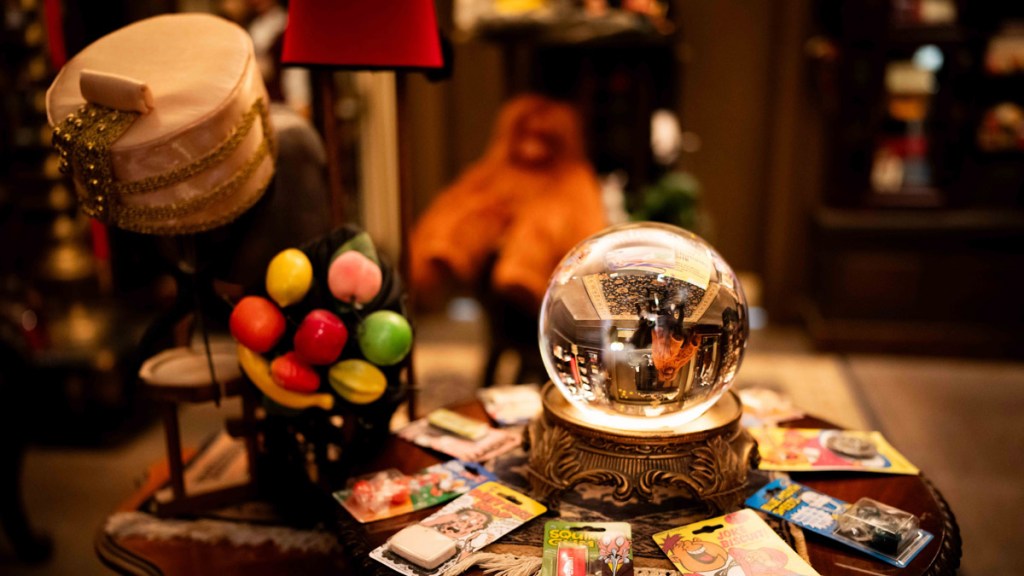
Adam and the Them, Anathema, Newt and co. may not be appearing in Good Omens season two, but that does not mean they’re not still present in some form. Here are just a few of the references to beloved season one characters that you might be able to spot in the background this season.
- To the left of Aziraphale’s desk in his office is a shelf full of ringbinders. These are, in fact, Wensleydale’s collection of The Wonders of Science and Nature magazines, which he donated to the bookshop.
- One of the paintings in the pub The Dirty Donkey shows a dramatic image of Agnes Nutter being burned at the stake.
- The crystal ball in the magic shop seen in Episode 4’s 1940s-set minisode ‘Nazi Zombie Flesheaters’ is the same one used by Anathema Device in season one.
- The jukebox in The Resurrectionists pub in Edinburgh that plays Buddy Holly’s ‘Everyday’ no matter what the customer selects is a reference to a joke from the book that was left out for season one. The book’s narration informs us that any cassette tape left in the car too long (it was 1990, remember) eventually turns into Best of Queen (the Good Omens-verse equivalent of Queen’s Greatest Hits, presumably).
- And of course, the registration plate on Crowley’s Bentley still reads NIAT RUC – CURTAIN backwards, a reference to Monty Python’s The Meaning of Life, where it appears written on a mausoleum to symbolise the final curtain.
- Aziraphale has obviously been using Gabriel’s box for storage, as the two plays we can see in the box in episode six are mentioned in Aziraphale’s introduction in the book; they are lost plays of Shakespeare Aziraphale has managed to get hold of, An Excellent Conceited Tragedie called Golde Diggers of 1589 and The Comedie of Robin Hoode, or, The Forest of Sherwoode. The existence of lost Shakespeare plays is real, but the specific titles are jokes from the book (this third is The Trapping of the Mouse, a reference to both the play within a play in Hamlet and the world’s longest-running play by Agatha Christie).
- In episode six, ‘A Nightingale Sang in Berkeley Square’ is, of course, the song that was playing while Crowley and Aziraphale were dining at the Ritz at the end of season one, and includes a lyric about “angels dining at the Ritz”.
Terry Pratchett

There are, of course, several references to the late, great Terry Pratchett, co-author of the original novel, and to his most famous creation, the Discworld.
- Pterry’s famous hat, which he could so often be seen wearing, and his scarf are still hanging from the coatrack in Aziraphale’s bookshop.
- When Gabriel/Jim shows the angels a “bendy” book in episode two, the book he shows them is the very first Discworld novel, The Colour of Magic.
- In Episode 3’s minisode ‘The Resurrectionists”, Dr Dalrymple’s laudanum proclaims on the label that it is guaranteed by C.M.O.T. Dibbler chemists. Cut-Me-Own-Throat Dibbler is a beloved Discworld character who turns up anywhere there is money to be made, but can most often be found selling inedible pies and sausages-inna-bun on the streets of the Disc’s premier city, Ankh-Morpork.
- Among the graffiti on the wall of Give Me Coffee Or Give Me Death is a snake image with the names Terry and Neil written on it.
- The Dirty Donkey also features a portrait of Pterry dressed as the Witchfinder General.

- The magic shop seen in Episode 4’s minisode ‘Nazi Zombie Flesheaters’ has a stuffed orang-utan sitting on a shelf, a nod to beloved Discworld character The Librarian (a wizard who was turned into an orang-utan in a magical accident early on and decided to stay that way).
- In episode five, at Aziraphale’s ball, Mrs Sandwich (Donna Preston) tries desperately to explain what she does for a living (she is a madam for what appears to be a fairly classy escort service) but is only able to state repeatedly that she is a “seamstress”. A Merchant’s Guild survey in the Discworld’s Ankh-Morpork famously found 987 women who gave their profession as “seamstress” and two needles. The motto of the city’s Guild of Seamstresses is “Nil Volupti Sine Lucre” – No Pleasure Without Pay.
Casting Gags and References
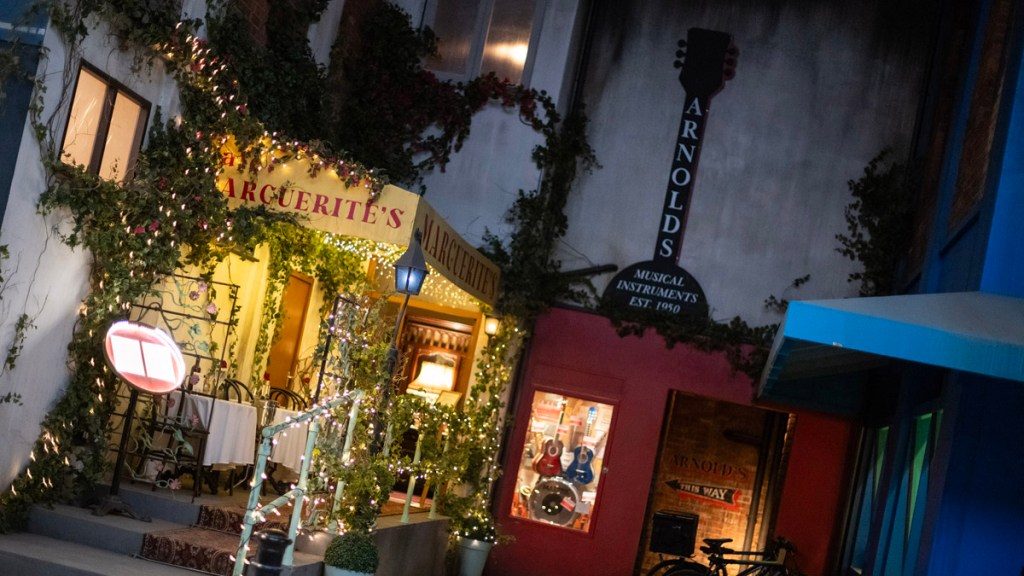
Much of the cast of Good Omens season two will be familiar to viewers, whether they’re actors reprising their roles from season one, like Jon Hamm as Gabriel/Jim, or actors from season one returning to play new characters, like Miranda Richardson (Madame Tracy/Shax), Nina Sosanya (Sister Mary Loquacious/Nina) and Maggie Service (Sister Theresa Garrulous/Maggie). But some other second season guest stars may be familiar from other places…
- In Episode 2’s minisode ‘A Companion to Owls’, Job is played by David Tennant’s father-in-law Peter Davison (best known as the Fifth Doctor from Doctor Who, in which Tennant of course plays the Tenth and Fourteenth Doctors) and Job’s son Ennon is played by Ty Tennant, Davison’s real-life grandson and David Tennant’s son (seen in 2022 playing Young Aegon Targaryen in HBO’s House of the Dragon).
- Episode 4’s minisode “Nazi Zombie Flesheaters’ stars Steve Pemberton, Reece Shearsmith and Mark Gatiss, a.k.a. The League of Gentlemen. Pemberton and Gatiss are reprising their roles from season one in zombie form, while Shearsmith, who played Shakespeare last time, now gets to share the screen with his fellow Gentlemen as the demon Furfur.
- The owner of the magic shop in the same minisode is played by Pete Firman, a magician and comedian. Reece Shearsmith also has a strong interest in magic, which previously featured in the ‘Misdirection’ episode of his and Pemberton’s anthology show Inside No. 9.
- The Whickber Street (itself a not-so-coded version of Berwick Street in Soho) music shop is named Arnold’s in homage to Good Omens composer David Arnold.
- In episode six, in The Resurrectionists pub, there’s a pub mirror advertising “John Hamm Martini”, in reference to the Mad Men actor who plays Gabriel/Jim.
Doctor Who
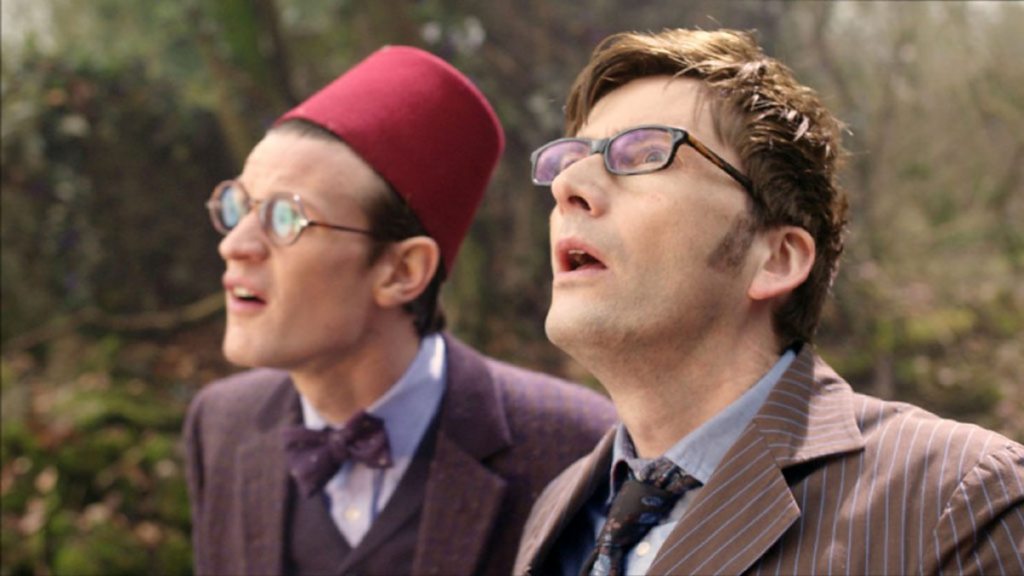
No one will be surprised to hear that there are quite a few more references to Doctor Who, as well as the casting of the Fifth Doctor (Davison) and one of the show’s best known writers/guest stars (Gatiss). Not only is David Tennant most famous as the Tenth/Fourteenth Doctor, Neil Gaiman has also written episodes of the show and Michael Sheen guest-starred in Gaiman’s first episode, ‘The Doctor’s Wife’ as the voice of House, so Doctor Who references are really part of Good Omens’ DNA.
- On his way to Edinburgh in episode three, Aziraphale plays Glenn Miller’s ‘Moonlight Serenade’ in the Bentley. This piece featured in Doctor Who’s World War Two-set two-parter, ‘The Empty Child/The Doctor Dances’ (a story which significantly set up the Doctor as a character with possible romantic interests and implied that he was not, as many fans had thought for some years at the time, asexual), as well as ‘Revelation of the Daleks’.
- In the magic shop in episode four’s minisode, David Tennant as Crowley plays with a fez; this was a frequent tic of his successor as the Doctor, Matt Smith’s Eleventh Doctor, who liked to proclaim that “fezzes are cool”.
- In episode five, Aziraphale bribes Mr Arnold, owner of the music shop on Whickber Street, with a proof copy of a 1965 Doctor Who Annual. The Doctor Who Annuals were published by the BBC between 1965 and 1985, but were dated to the year following their publication, i.e. the first annual was published in September 1965 but dated 1966; Aziraphale presumably has a proof copy of an attempted 1964 annual that would have been dated 1965.
- When Mr Arnold later plays the harpsichord during the ball, he is playing some sheet music titled “The Dr Who: A Musical”. No official Doctor Who musical exists (though there are rumours that a musical episode might be coming in 2024) but there are a few fan-made musicals about the show. The title is also a reference to a longstanding debate between fans over whether the title character is “The Doctor” (preferred by most) or “Dr Who” (as they have occasionally been credited).
- Crowley’s reaction to taking laudanum in episode three’s minisode ‘The Resurrectionists’ is very similar to the Doctor’s reaction to getting poisoned in the Doctor Who episode ‘The Unicorn and the Wasp’.
- The Metatron is played by Derek Jacobi, who previously appeared as an incarnation of The Master in Doctor Who.
- Beelzebub describes the container fly in Episode 6 as “bigger on the inside”, which is, of course, the way just about everybody who sets foot inside it describes the TARDIS (except Victorian Clara, who said it was “smaller on the outside”).
Books
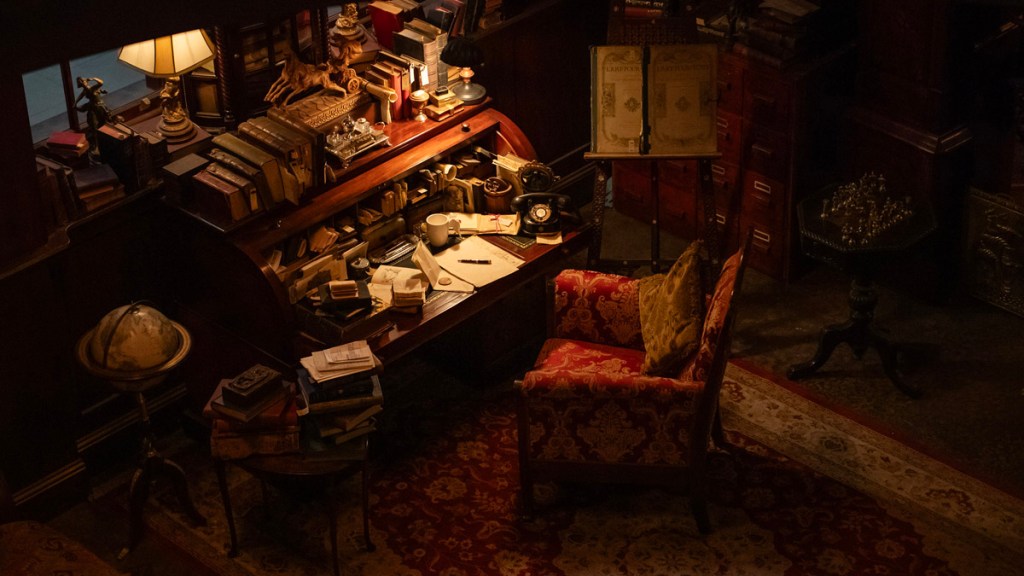
Since Aziraphale runs a bookshop that never sells any books, it is hardly surprising that there are quite few Easter eggs and references tucked away in the books we see in his shop. We’ve already noted the appearance of Pratchett’s The Colour of Magic. But there are a few more book-related Easter eggs for viewers to spot as well.
- In episode two, Gabriel decides to re-organise all the books alphabetically by the first letter of the first sentence. The first one he reads out loud is, “It was the best of times, it was the worst of times” which is the first line of Charles Dickens’ A Tale of Two Cities. This is an extremely long opening sentence intended to introduce the period setting of the book that takes up a whole paragraph, and which, a bit further down the page, also features the phrase, “we were all going direct to Heaven, we were all going direct the other way”.
- Later on he reads “It was the day my grandmother exploded”, which is the opening line of Iain Banks’ The Crow Road, a novel about murder and love, the television adaptation of which featured the Twelfth Doctor and one of the stars of Neil Gaiman’s Neverwhere, Peter Capaldi. This is the same book that Crowley gives to Muriel to read in episode six.
- Next to The Crow Road goes Jane Austen’s Pride and Prejudice, which begins “It is a truth universally acknowledged that a single man in possession of a good fortune must be in want of a wife”. We had already seen Crowley re-shelve Pride and Prejudice in a more sensible location earlier in the episode, among the other novels of Jane Austen. There are numerous references to Jane Austen and especially to Pride and Prejudice throughout the season, reflecting the romantic stories it is telling.
- Next to these is a book which opens “In The Beginning” and then “It was a nice day. / All the days had been nice”. This is the first page of Good Omens, by Terry Pratchett and Neil Gaiman.
- The heavy book Gabriel uses as a fly-swatter is The Wicked Bible. Although it should not really appear on the cover (perhaps it has been rebound) this is a real book, as it is the nickname of a 1631 edition of the King James Bible that accidentally left out the word “not” from the Commandment “Thou shalt not commit adultery” due to a printing error. The Good Omens book specifically mentions Aziraphale owning a collection of Bibles including The Wicked Bible.
- The songs/bands on the jukebox in The Resurrectionists pub are a mixture of Scottish bands or musicians and puns about Heaven: Mull of Kintyre by P. McCartney/Wings, Girls School, Daddys Gone and Flowers and Football Tops by Glasvegas, Shang a Lang by The Bay City Rollers, Dignity, by Deacon Blue, Suffering, Letter from America, by The Proclaimers, I’m Lucky, News From Heaven [band]
Jim’s Book Shelving
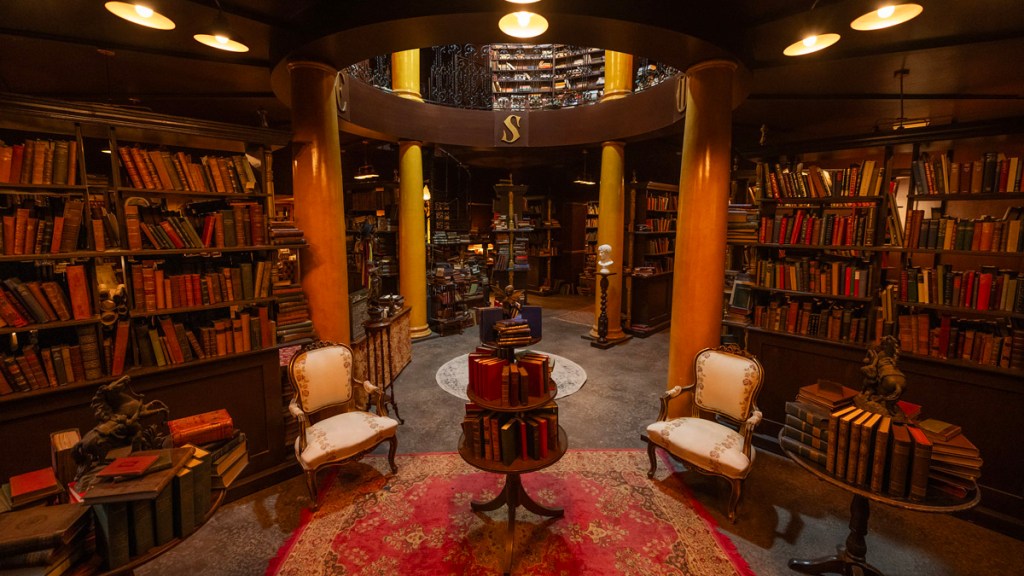
When Gabriel is shelving his books that start with “It”, we see him place The Crow Road and Pride and Prejudice on a bookshelf among several other titles featuring opening sentences that start with I, all selected by director Douglas Mackinnon. We could not quite make out all the titles on screen – there is something there by Colombian novelist Gabriel García Márquez, presumably as a nod to Gabriel’s true identity, but we could not make out the title, plus one other. We did manage to identity most of them though, and here is the list – as you will see, Gabriel still has not quite got the hang of the alphabet and seems to be shelving them backwards, with N coming after T and F coming after N.
- I Capture the Castle by Dodie Smith, a story about first love which features a character who, like Aziraphale, wants to live in a Jane Austen novel, and another who wrote a book about Jacob wrestling an angel. The opening line is “I write this sitting in the kitchen sink”.
- No Woman, No Cry by Rita Marley, a biography of Bob Marley written by his wife (and a shout-out to Jacob Marley and the ghosts of Dickens’ A Christmas Carol, who make Scrooge a better person using the past, present and future). The opening line of the first chapter is “I was an ambitious girl child”.
- The Curious Incident of the Dog in the Night-time by Mark Haddon, a mystery novel with an autistic narrator whose title references a Sherlock Holmes short story. Opening line: “It was 7 minutes after midnight”.
- Catch-22 by Joseph Heller, a war novel which coined the phrase “catch-22” for a situation in which a problem is impossible to solve because of contradictory rules, and the solution to the problem may also be the cause of the problem. Opening line: “It was love at first sight”.
- Nineteen-Eighty-Four by George Orwell, the famous book about a dystopian future full of fake news and “doublethink” (accepting two mutually contradictory things at once) that coined the phrase “Big Brother is watching you” and introduced the torture chamber “Room 101”, in which victims are forced to endure their worst nightmares. The opening line is one of the most famous in literature; “It was a bright cold day in April, and the clocks were striking thirteen”.
- The Big Sleep by Raymond Chandler, the first of his hardboiled crime novels featuring detective Philip Marlowe. The opening line is, “It was about eleven o’clock in the morning, mid-October, with the sun not shining and a look of hard wet rain in the clearness of the foothills”.
- The Bible, just one of Aziraphale’s extensive collection of various editions. The first line of Genesis in the King James Version is translated into English as “In the beginning God created the heaven and the earth”.
- The Great Gatsby by F Scott Fitzgerald, a Jazz Age novel about class prejudice, wealth and poverty, and doomed love. Opening line: “In my younger and more vulnerable years my father gave me some advice that I’ve been turning over in my mind ever since”.
- The Catcher in the Rye by J. D. Salinger, a coming-of-age story about a rather whiny teenager. The opening sentence is, “If you really want to hear about it, the first thing you’ll probably want to know is where I was born, and what my lousy childhood was like, and how my parents were occupied, and all that David Copperfield kind of crap, but I don’t feel like going into it, if you want to know the truth.”
- Herzog by Saul Bellow, a novel about a protagonist named Moses E. Herzog having a mid-life crisis. Not only is Moses, of course, a Biblical name, but Saul was the original name of Paul of Tarsus, otherwise known as St Paul, one of the founding figures of Christianity. The opening line, which is very appropriate for Gabriel’s situation in that moment, is, “If I am out of my mind, it’s all right with me, thought Moses Herzog.”
We can see the themes of the season represented here – mystery, love, people trapped by class or bureaucracy, and Biblical puns.
Miscellaneous

There are all sorts of other little treats and nods to popular culture scattered throughout the series – here are just a few of the things we liked.
- The name of Nina’s coffee shop, Give Me Coffee Or Give Me Death, is apparently a shout-out to a famous stand-up sketch by Suzy Eddie Izzard, in which he explains why the Spanish Inquisition would not have worked if carried out by the Church of England, because they would just offer victims “tea and cake or death?” and everyone would choose cake.
- Crowley calls Aziraphale Lady Bracknall, the snobbish upper class older lady from Oscar Wilde’s The Importance of Being Earnest, a play all about identity mix-ups and confusion around a lost baby, a call-back to the baby mix-up that kicked off Good Omens season one.
- Jane Austen as a rather violent inhabitant of Hell was a regular feature in Old Harry’s Game, a Radio 4 comedy set in Hell and exploring Satan’s trials and tribulations.
- Crowley observes that Heaven measures miracles in “Lazari”, i.e. how much power it would take to raise someone from the dead, a reference to Jesus’ friend Lazarus whom Jesus raised from the dead in the Gospel of John 11:1-45.
- The Jukebox that always plays ‘Everyday’ is called High Fidelity, which is the title of a romantic novel by Nick Hornby (with a 2000 film adaptation) about a record shop owner that features music heavily.
- Gabriel’s cover name “Jim” is the same as the name of the angel Castiel’s human host Jimmy in the long-running series Supernatural, which was frequently influenced and inspired by the works of Neil Gaiman.
- A frequent folklore trope involves getting stuck in the land of the Fae if you eat their food, which appears to have happened to Aziraphale with Earth and human food.
- Every episode features a reference to the films of Michael Powell and Emeric Pressburger, especially to their 1945 film A Matter of Life and Death, which is also Michael Sheen’s favourite film. More on that here. In The Resurrectionists pub, there are several posters for a brand of “Pressburger Lager”.
- In episode six, Aziraphale says “I haven’t done this since the Great War” when he weaponizes his halo, implying that he was one of the Angels of Mons supposedly seen fighting for the British in 1914.
- In episode six, when Gabriel and Beelzebub meet in the pub The Resurrectionists, the TV is playing the film The Spirit of St Louis, a film about Charles Lindbergh’s solo flight across the Atlantic in which Lindbergh is saved when he is woken by a fly.
Good Omens season two is available to stream now on Prime Video.
